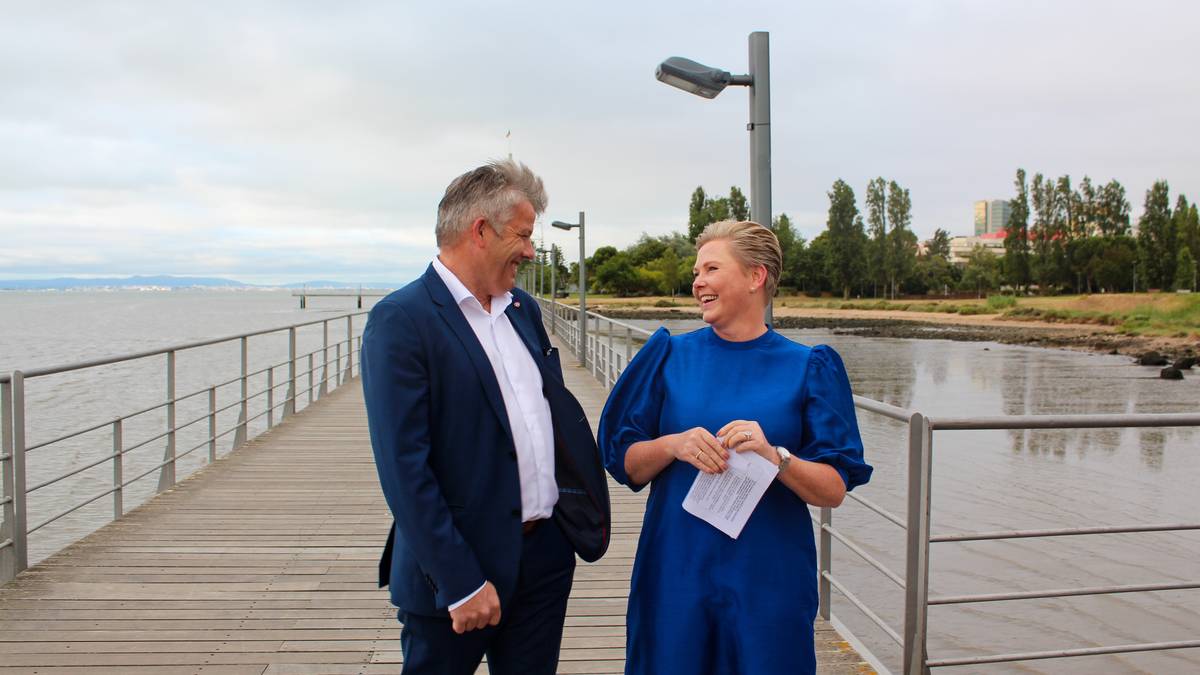Illegal fishing and other fishing crimes contribute to overfishing worldwide. A UN report from 2020 shows that over 1/3 of the world’s fish stocks are overfished.
This can have major consequences. Many vulnerable coastal communities depend on fish for food.
– Norway is a large port nation. We have developed a unique tool for satellite tracking to detect illegal fishing in our own waters, says a press release.
The government will use Norwegian satellites to give developing countries an opportunity to detect illegal fishing.
–We have the tools that can contribute to a solution to a major problem we all benefit from settling with, says Minister of Fisheries and Marine Affairs Bjørnar Skjæran.
Minister of Fisheries and Maritime Affairs on a building in Lisbon. This week he is attending the UN Maritime Conference.
Photo: Anne Skifjeld / NRK
– Can make a difference
He and Minister of Development Anne Beate Tvinnereim today announce this initiative which will ensure that data is shared with selected member countries.
Both are attending the UN Maritime Conference in Lisbon. The conference aims to develop knowledge-based solutions for the sea. What the ministers are launching today, they think they can be part of this goal.
NRK
explains
How is the sea?
Scroll on
The sea and climate
The ocean absorbs about a quarter of all the CO2 humans emit into the atmosphere. Without these, temperatures would have already risen more than graded since pre-industrial times.
But the uptake of CO2 makes the ocean safe. It can damage the ecosystems of the ocean. Ocean acidification could have a major effect on marine ecosystems if emissions continue as they do now.
The sea and pH
The pH in the sea surface is the lowest in 26,000 years. When the pH of the ocean drops, the sink also has the capacity to absorb CO₂ from the atmosphere.
About 23 percent of the annual man-made emissions of CO are absorbed by the ocean. It makes the sea more acidic. This threatens wildlife and ecosystems.
The sea and the economy
The marine economy is among the fastest growing in the world, and offers many benefits to many sectors that have great economic value, such as fisheries, transport, biotechnology and energy production and more.
Globally, the market value of marine and coastal resources and industries is estimated at $ 3 trillion each year, or about 5 percent of global gross domestic product.
the sea and pollution
Every year, about 11 million tons of plastic end up in the ocean, costing the world around $ 12 billion in economic costs, including cleanup work, losses in the fishing industry and other industries.
About 80 percent of maritime and coastal pollution comes from land, and includes agricultural runoff, pesticides, plastics and untreated sewage.
89 percent of the plastic waste found on the seabed is disposable plastic, such as plastic bags. More than 800 species are affected by marine plastic, through intake, development and change of habitat. Every year, more than one million seabirds and 100,000 mammals are killed by plastic debris.
The sea and heating
In 2021, sea temperatures were the highest recorded. They exceeded 2020 by somewhere between 9 and 14 zettajoules.
One-half zettajoule is roughly equivalent to the annual energy consumption worldwide.
The heat penetrates deeper and deeper into the sea. Large parts of the world have experienced at least one strong heat wave during last year.
Coral reefs are particularly vulnerable. It is expected that 70-80 percent of them will disappear with a warming of 1.5 degrees. At 2 degrees, over 99 percent will disappear.
The sea is rising
The sea is rising faster than ever. The last eight years at 4.5 millimeters per year. Sea level rise is mainly due to meltwater from ice in the Arctic and from glaciers.
The world’s glaciers have averaged 33.5 meters lower since 1950. 76 percent of these have disappeared since 1980.
The Norwegian Coastal Administration is given the task of assessing how data can be shared directly. In this way, the countries themselves can carry out analyzes and uncover fishing crime.
– Norwegian technology can make a big difference for countries that cannot afford to obtain such data on their own, says Skjæran.
Minister for Development Aid Tvinnereim, says that she believes the Norwegian satellites will be an important resource for developing countries. After two years of pandemics, the war in Ukraine, and record high food prices, the number of people starving has more than doubled in years.

Satisfied: Minister for Development Aid Anne Beate Tvinnereim is pleased that Norway will now help developing countries to fight illegal fishing.
Photo: Anne Skifjeld / NRK
– If we share our technology and long experience of managing our marine resources in a way that is also good for the future, it will be able to serve many developing countries, she says.
– An important key
Karoline Andaur, Secretary General of the WWF World Wide Fund for Nature, believes the government’s initiative is positive.

Secretary General of the WWF World Wide Fund for Nature Karoline Andaur.
Photo: Haakon Nordvik / WWF World Wide Fund for Nature
– Fighting fishing crime is an important key to saving the sea.
She says that one of the reasons why it is important to fight illegal fishing is that fishing boats can be used for human trafficking, drug smuggling and illegal arms transport.
– In addition, many countries are dependent on fishing, both for workers and to get food for the population, Andaur says.

